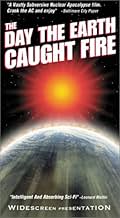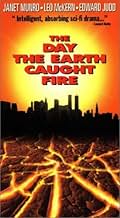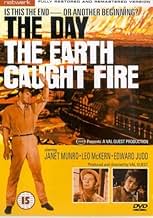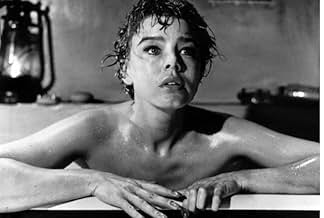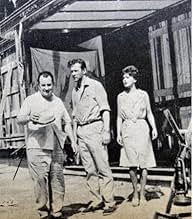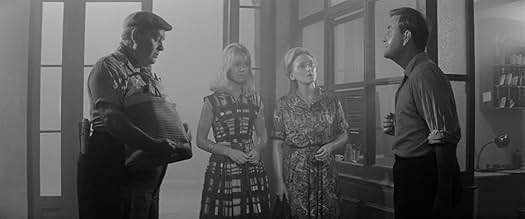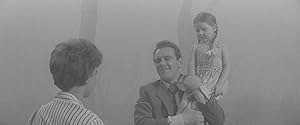Agrega una trama en tu idiomaWhen the U.S. and Russia unwittingly test atomic bombs at the same time, it alters the nutation (axis of rotation) of the Earth.When the U.S. and Russia unwittingly test atomic bombs at the same time, it alters the nutation (axis of rotation) of the Earth.When the U.S. and Russia unwittingly test atomic bombs at the same time, it alters the nutation (axis of rotation) of the Earth.
- Dirección
- Guionistas
- Elenco
- Ganó 1 premio BAFTA
- 1 premio ganado y 1 nominación en total
- Constable
- (sin créditos)
- Mother
- (sin créditos)
- 1st Sub-Editor
- (sin créditos)
- Policeman
- (sin créditos)
- Printer in Printroom
- (sin créditos)
- Copy Desk
- (sin créditos)
- Copy Boy
- (sin créditos)
- Man at Water Station
- (sin créditos)
- Dirección
- Guionistas
- Todo el elenco y el equipo
- Producción, taquilla y más en IMDbPro
Opiniones destacadas
Judd plays his character a little roughly, but that is to be understood, given his problems with his divorce and visitation with his young son.
Leo McKern's dialogue and facial expressions are superb and create the perfect persona of the seasoned veteran science writer who interprets and unravels the mystery for us.
Janet Munro, who died prematurely in her thirties gave a very acceptable performance for a young starlet, who keeps reporter Pete Stenning (Judd) at bay, then feeds him the critical information that blows open the story. I have two copies - One I taped from TV in the 80's, and another that I bought new. My sci-fi collection wouldn't be complete without it.
Was any science fiction movie ever more ambitious than this one? The staggering opening, tinted in reddish yellow and brilliantly composed in widescreen, looks like Tarkovsky and Lars von Trier, and has the same dry wasteland quality to it. Callous and unpublicized nuclear tests by both the Soviet Union and the US have upset the environment, causing record-breaking heat waves, floods, cyclones, eclipses, and what not, and we gradually find out that Earth has tilted and is hurtling towards the Sun where, in four months' time, the universe will savor "the delightful smell of charcoaled mankind", as put by a cynical newspaperman. The largest nuclear bomb ever made will now be detonated in Siberia, and no one knows what will happen now ... The environmentalist discourse seems extremely contemporary to us today.
Now, how to make intelligent, thoughtful entertainment out of that pulp?! Leave it to writer-director Val Guest who more than rose to the task. He put a heartbroken, newly divorced and slightly alcoholized reporter in the center, working for the London Daily News. He tries, with his science editor and surrogate father, to delve into what went wrong and who is responsible, and he falls in love with a switchboard girl with a cleavage. All this to keep the movie grounded, the drama realistic. All of this naturalistic drama is cross-edited with stock newsreel footage of natural disasters, and it works. It works supremely well, and you are sucked into the action, as the end of the world approaches.
All the actors are brilliant, not least Edward Judd as the main reporter, cynical, witty, vulnerable.
The film's greatest strength is in its understated, matter-of-fact presentation of the characters' various reactions to the relentlessly deteriorating situation. The performances are consistently honest and compelling, from the principal players down to the smallest walk-on parts. The award-winning script by Wolf Mankowitz is at times almost too clever for its own good. If there is one criticism that may be leveled against it, it is that most real people are not that consistently witty. Occasionally they are at a loss for words. Occasionally they say things that are lame, stupid, and altogether inappropriate. And this is the one element that was pretty much absent from the dialogue.
In an age when movies are being strangled to death by their own special effects, and character development often does not extend beyond the crudest bodily functions and four-letter expletives, it is genuinely refreshing to return to a film such as this one. Not only does it not rely on visual effects to tell its story, it is really so little dependent on the visual that it could have been equally successful as a radio drama (a forgotten art form nowadays), and might very well have caused an even greater panic than Orson Welles' "War of the Worlds."
Although the plot is quite similar to that of 'When Worlds Collide', the realism of the characters and setting really lift the whole film far above its contemporaries. Its use of journalists to tell the story is similar to that of many of the classic works of literary science fiction (HG Wells' War Of The Worlds or John Wyndham's Kraken Wakes for example) and it follows a similar apocalyptic template as well.
The theme of mankind's actions causing havoc for the globe, which was originally a criticism of the cold war, is still very relevant today for quite different reasons. The parallel with global warming is obvious, and the graphic depiction of the effects of this are all the more disturbing because we see similar effects, on a smaller scale, around the world on a day to day basis. The film is shocking in its bleak vision of the havoc that mankind has brought upon himself.
Basically, this is the benchmark for all serious science-fiction, and makes a perfect partner for the other great of the cold war era, "The Day the Earth Stood Still".
¿Sabías que…?
- TriviaAs the Earth heats up, Bill McGuire asks for information on the melting point of "everything from steel to my glass eye". Leo McKern had a glass eye.
- ErroresIn the movie, several people in North London contract "typhus" from contaminated water. Evidently the script confused "typhus" and "typhoid fever." Typhus is spread by parasites, such as fleas or mites; not contaminated water. Typhoid fever can be spread by contaminated food or water.
- Citas
Peter Stenning: So Man has sown the wind - and reaped the whirlwind. Perhaps in the next few hours, there will be no remembrance of the past, and no hope for the future that might have been. All the works of Man will be consumed in the great fire out of which he was created. But perhaps at the heart of the burning light into which he has thrust his world, there is a heart that cares more for him, than he has ever cared for himself. And if there is a future for Man - insensitive as he is, proud and defiant in his pursuit of power - let him resolve to live it lovingly; for he knows well how to do so. Then he may say once more: Truly the light is sweet; and what a pleasant thing it is for the eyes to see the Sun.
- Créditos curiososThere are no end credits whatsoever (not even a "The End" caption); merely a fade to black.
- Versiones alternativasAlthough listed as cut by the BBFC, the then censor John Trevelyan passed the film uncut according to his memoirs. The 'X' certificate was given due to the subject matter, and occasional tough language, being unsuitable for anyone under the age of 16. Video and DVD releases are now rated PG.
- ConexionesFeatured in Godzilla (1977)
Selecciones populares
- How long is The Day the Earth Caught Fire?Con tecnología de Alexa
Detalles
- Fecha de lanzamiento
- País de origen
- Idioma
- También se conoce como
- The Day the Earth Caught Fire
- Locaciones de filmación
- Productora
- Ver más créditos de la compañía en IMDbPro
Taquilla
- Presupuesto
- GBP 200,000 (estimado)
- Tiempo de ejecución
- 1h 39min(99 min)
- Relación de aspecto
- 2.35 : 1



